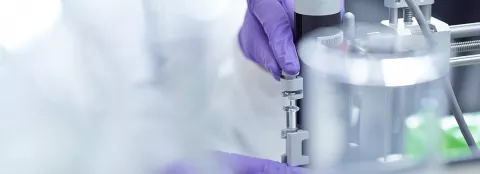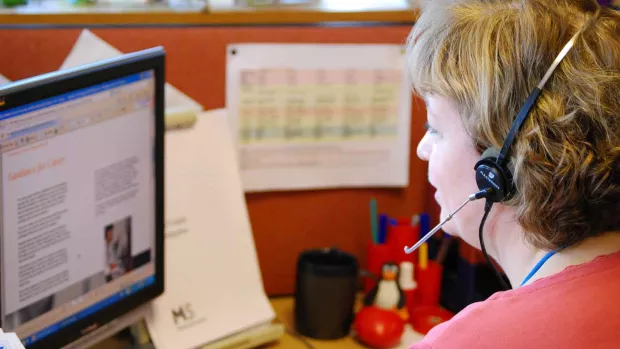
MS and COVID-19: New treatments available from mid-December
Find out about new COVID-19 treatments for people with MS.
The government announced on 8 December 2021 that people with MS in the UK would be eligible for one of two new treatments if they catch COVID-19 - molnupiravir and Ronapreve.
Since then, several new treatment options have been recommended by the NHS - first sotrovimab, and then in February 2022 Paxlovid and remdesivir. And Ronapreve is no longer being used.
All these new treatments are for people soon after catching COVID-19. COVID-19 treatments had previously only been available for people already in hospital.
We have several vaccines doing an incredible job protecting people from COVID-19. But we can’t rely on vaccines alone because they’re not 100% effective. We also need treatments to stop people getting seriously ill if they catch COVID-19.
What are the new COVID-19 treatments?
The five new COVID-19 treatments are called:
- Paxlovid
- remdesivir
- Molnupiravir
- sotrovimab
They work in different ways.
Paxlovid (drug names PF-07321332 (also known as nirmatrelvir) and ritonavir)
- Paxlovid is an antiviral treatment. Viruses work by making lots of copies of themselves inside your body. An antiviral treatment targets the virus at an early stage, making it harder for it to make copies of itself. This lowers the level of virus circulating in your body.
- Paxlovid is taken as tablets, so it can be taken at home.
- It’s not suitable if you’ve got certain health conditions or with some other medications. So doctors will ask about any therapies or medications you take. It can be taken with MS disease modifying therapies (DMTs), but you should still mention any you take to the treatment team when they’re in touch.
Remdesivir (brand name Veklury)
- Remdesivir is an antiviral treatment.
- If you’re offered remdesivir, it’ll be given through a drip in your arm (an infusion). That would usually be at your local hospital or in a local health centre.
- Treatment with remdesivir can start within 7 days of first symptoms. The other early treatments should start within 5 days.
Molnupiravir (brand name Lagevrio)
- Molnupiravir is an antiviral treatment.
- It’s taken as tablets, so it can be taken at home.
Sotrovimab (brand name Xevudy)
- Sotrovimab is an antibody treatment. Antibodies are molecules that our immune system makes. The antibodies recognise and neutralise threats.
- The antibodies in sotrovimab target the virus. They attach themselves to the virus and stop it from infecting our cells.
- If you’re offered sotrovimab, it’ll be given through a drip in your arm (an infusion). That would usually be at your local hospital or in a local health centre.
Other antibody treatments for COVID-19
Other antibody treatments are being used to treat people in hospital with COVID-19. This includes tocilizumab, the arthritis treatment. Dexamethasone (a steroid) is also being used to treat COVID-19.
These treatments target the immune system itself. This might seem counter-intuitive when fighting a virus. But some severe complications from COVID-19 happen because the immune system overreacts.
Why are people with multiple sclerosis eligible for these treatments?
MS is listed as one of the conditions making people eligible for direct access to the treatments. This is great news. It will hopefully prevent people with MS from being hospitalised with serious illness. But we know it can feel scary to be included in a group described as “the most vulnerable”. Especially as most people with MS haven’t been considered as “clinically extremely vulnerable” during the pandemic.
The decision isn’t based on any new information showing that MS can make people more vulnerable to getting seriously ill with COVID-19. And being eligible for these treatments doesn’t mean the vaccines haven’t been effective for you.
But we know some people with MS are at greater risk of severe illness if they catch COVID-19. This is because they have other risk factors. And some DMTs can make it less likely the vaccine will be as effective for you.
The Association of British Neurologists and our medical advisers recommend everyone with MS to get vaccinated. This includes the booster, when offered. Getting vaccinated is still the best way for most people to protect themselves and others. And people with MS can already book a booster jab three months after their primary doses.
Read about COVID-19 booster jabs for people with MS
How do I get Paxlovid, remdesivir, molnupiravir or sotrovimab?
You can now find the latest on how to get Paxlovid, remdesivir, molnupiravir or sotrovimab on our 'MS and coronavirus care and support' page.
Or you can read more below about getting molnupiravir on the PANORAMIC research study.
The UK government announced in December 2021 that if you’ve got MS, the NHS should contact you to let you know you are eligible for one of these treatments if you test positive. That should still happen in England, though you might not be contacted in advance if you’re in Wales, Scotland or Northern Ireland.
The NHS might send a letter, email or text with this information. You might need to check your email spam filter in case it's got stuck there.
If you've been diagnosed more recently than 15 November this year, your diagnosis won't be on the national system. In England, your neurologist will get in touch in the coming weeks instead. You don't need to contact them.
You might have already received a PCR testing kit to keep at home, with a letter explaining what to do if you notice symptoms. If you haven't, and you get symptoms, you can order a PCR test as you normally would. In Scotland, if you can't get to a testing site, you can order one to keep at home in case you get symptoms. In England, if you haven't received a PCR testing kit by 10 January, call 119 for advice (choose the 'test and trace' option).
If your PCR test result is positive, you should hear from the NHS in England, Northern Ireland or Wales within 24 hours to discuss your treatment options. If you haven't heard by then, call your GP or 111 who can refer you. In Scotland, if you get a positive PCR result, find your local health board's COVID team and call them to arrange an assessment.
Molnupiravir is taken as a tablet. So someone can collect it for you or you can have it delivered to your home.
Sotrovimab and Ronapreve are given as an infusion at a clinic. When the NHS contact you to discuss your treatment option, they should also discuss how you can get safely to and from the clinic.
These new treatments should be available across England, Wales and Northern Ireland from 16 December, and in Scotland from 22 December.
If you want to speak to someone about any of this, you can get in touch with our MS Helpline on 0808 800 8000.
The PANORAMIC research study into molnupiravir and Paxlovid
A study called PANORAMIC is also looking at molnupiravir and Paxlovid. PANORAMIC is a platform trial like our own Octopus trial. So it’s testing several treatments over time.
They’re recruiting 10,000 people to take part, and anyone over 50 is eligible. Including adults with health conditions like MS or people receiving treatments making them more vulnerable.
If your PCR or lateral flow test is positive and your COVID-19 symptoms started in the last five days, you can sign up for the study on their website. The research team might also get in touch through your GP.
If you agree to be part of the trial, you'll be randomly assigned to take molnupiravir, Paxlovid or continue with the usual care.
The first results are expected in 2022. And they’ll help the NHS develop a plan to offer the treatment on a wider scale.



